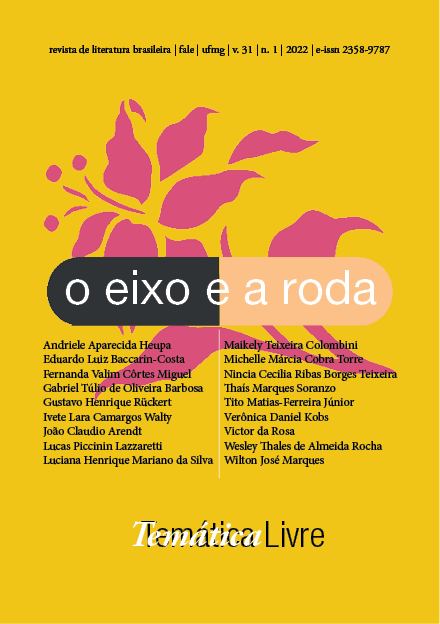Horizontal Anthtopophagies
Silviano and Machado
DOI:
https://doi.org/10.17851/2358-9787.31.1.07-27Keywords:
metaphors, anthropophagic movements, literary projects, territorialitiesAbstract
In the research “Literary territorialities: projects in dialogue”, I have investigated the configuration of writing projects by Brazilian authors regarding their relationship with the concepts of literature, nation, intellectual/writer and their performance in the public space, always considering their transformations in the horizon of the aesthetic, ethical and political relationship. For such, I have used the concepts of territory, map, circuit, recursion, and anthropophagic movements as reading operators. Based on Raffestin (1993, apud CANDIOTTO; SANTOS, 2008, p. 160) that territoriality can be defined as a set of relationships that originate in a three-dimensional system of society-space-time, in this work, I analyze the relationship between the works of Silviano Santiago and Machado de Assis, outlining their literary projects, given by themselves as territorialities. Thus, I aim at investigating the metaphors that articulate the construction of Santiago’s texts in their hybrid composition, as well as delineating signs of other territorialities, especially those that concern the place of literature in Brazil, its agents and objects.
Downloads
References
BARTHES, R. “Escrever a leitura”. In: O Rumor da Língua. São Paulo: Martins Fontes, 2004, p.29.
BARTHES, R. Escritos sobre teatro: textos reunidos e apresentados por Jean-Loup Rivière. Tradução de Mario Laranjeira. São Paulo: Martins Fontes, 2007.
BENJAMIN, W. Teses sobre a filosofia da história. In: Obras escolhidas. V.1. Magia e técnica, arte e política. Tradução de Sérgio Paulo Rouanet. São Paulo: Brasiliense, 1987, p. 222-232.
BRANDT, P. A. D’où vient le sens ? – Remarques sur la sémio-phénoménologie de Greimas. 2018. Disponível em: http://www.academia.edu/6819523/From_linguistics_to_sémiotics._Hjelmslevs_fortunate_error Consultado em 01/08/2019.
BRANDT, P. A. From gesture to theatricality: on enunciation and the art of being visible. In: BRANDT, P. A. Spaces, domains, and meaning: essays in cognitive semiotics. European Se-miotics Series Vol. 4. Peter Lang, 2004. p. 211-233.
CANDIDO, A. A natureza da metáfora. O estudo analítico do poema. São Paulo: Humanitas, 1996.
CANDIOTTO, L. Z. P.; SANTOS, R. A. Experiências geográficas em torno de uma abordagem territorial. In: SAQUET, Marco Aurelio; SPOSITO, Eliseu Savério (Org.) Territórios e territorialidades: teorias, processos e conflitos. São Paulo: Expressão Popular: UNESP, 2008.
DERRIDA, J. Gramatologia. Tradução de Mirim Schnaiderman e Renato Janine Ribeiro. São Paulo: Perspectiva/USP, 1973.
JOHNSON, M. The Body in the Mind: the Bodly Basis of Meaning, Imagination, and Reason. Chicago: The University of Chicago Press, 1987.
JOHNSON, M. The Meaning of the Body: A esthetics of human undestanding. Chicago: The University of Chicago Press, 2007.
MACHADO DE ASSIS, José Maria. Tempo de crise. In: Outros contos. Obra completa v. 2. Rio de Janeiro: Nova Aguilar, 1994.
ORTIZ, F. Contrapunteo cubano del tabaco y el Azucar. Habana: Direccion de publicaciones Universidad Central de las Villas, 1963.
RAMA, A. Transculturacion narrativa en America latina. Montevideo: Siglo Veintiuno/ Fundacion Angel Rama, 1989.
RANCIÈRE, J. O desentendimento: política e filosofia. Tradução de Ângela Leite Lopes. São Paulo: Editora 34, 2018.
SAID, E. Humanismo e crítica democrática. Tradução de Rosana Eichenberg. São Paulo: Companhia das Letras, 2004.
SANTIAGO, S. Machado. São Paulo: Companhia das Letras, 2016.
SANTIAGO, S. Apesar de dependente, universal. In: Vale quanto pesa. Rio de Janeiro: Paz e Terra, 1982, p. 13-24.
SANTIAGO, S. “Anatomia da formação. A literatura brasileira à luz do pós-colonialismo”. Folha de São Paulo/Ilustríssima, 2014, p.4-5. Disponível em http://www1.folha.uol.com.br/fsp/ilustrissima/184397-anatomia-da-formacao.shtml?origin=folha. Consultado em 30 de março de 2020.
SANTIAGO, S. O cosmopolitismo do pobre. Belo Horizonte: Editora da UFMG, 2004.
SANTIAGO, S. Por que e para que viaja o europeu? In. Nas malhas da letra. Rio de Janeiro: Rocco, 1989.
SANTIAGO, S. Uma literatura nos trópicos. São Paulo: Perspectiva. 1978.
SCHWARZ, R. As ideias fora do lugar. In: Ao vencedor as batatas. São Paulo: Duas cidades, 1975.




 Esta obra está licenciada com uma Licença
Esta obra está licenciada com uma Licença 